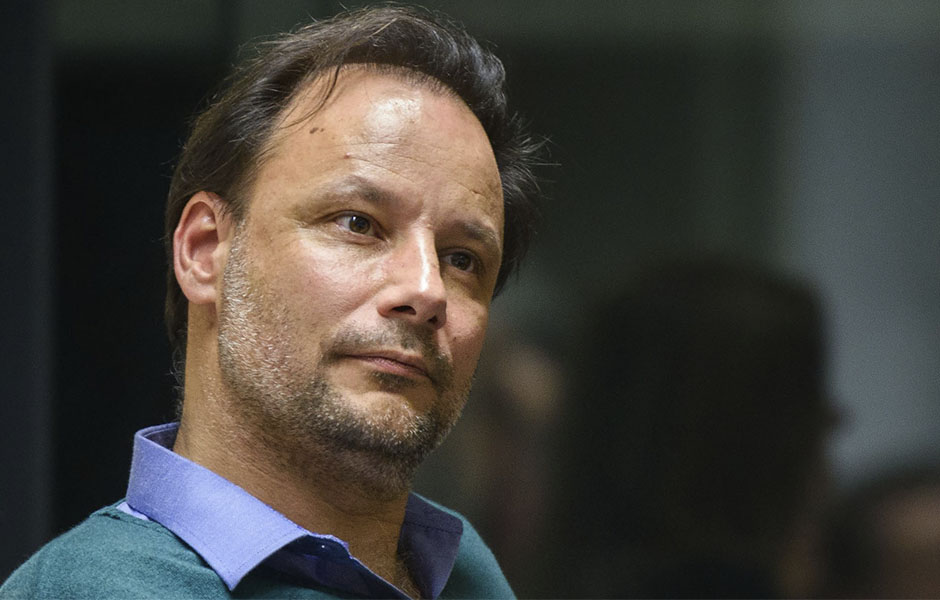Miguel Ricou is a psychologist, a professor and a bold researcher who dares to address taboo subjects. He is currently an integrated researcher of the ManEthics group at CINTESIS and the author of a pioneering work in the field of professional ethics. Sexual education, abortion and euthanasia are some of fields he studies. Recently, he founded the European platform “Wish to Die”, aiming to contribute to the discussion of this matter.
When he was a kid, he wanted to be a doctor, but his qualifications did not meet the university entry requirements. He started working before going to college. In 1991, thanks to his mother’s hard work, he was one of the first Psychology students at the Instituto Superior de Ciências da Saúde do Norte (northern school of health sciences). There he met Rui Nunes, his professor, who invited him to join the Bioethics Service of the Faculty of Medicine of the University of Porto (FMUP). It was 1996 and the research topic was deafness. “I began to see a connection between Ethics and Psychology. Ethics is the science of relationship and the working tool of Psychology is relationship,” he explains.
He worked as a professor and at the same time had his private practice. He earned his Master in Bioethics from FMUP with a thesis on the ethical principles of psychologists, which later resulted in the book “Ethics and Psychology: An Integrated Practice”. He joined projects in the area of drug addiction and set up a Psychology consultation office at the Espinho Health Center, where he received patients from the community and persons who were holders of the so-called guaranteed minimum income. At the beginning of the millennium, he created a Psychology service at the São João Health Center, proving that the intervention of a psychologist can diminish the visits to the family doctor.
He is keen to balance his clinical practice with his teaching and research activity. “I think clinical practice is essential. If we do not have contact with clinical practice, we are limited in our practical perception of the impact of Ethics”, he says. He participated in the creation of the Order of Psychologists, and was one of the persons responsible for the creation of the Code of Ethics, where the ethical principles of Portuguese psychologists are formulated, a topic he developed during his PhD studies in Clinical Psychology at the University of Coimbra, completed in 2012. Between 2010 and 2014, he was president of the Jurisdictional Council of this professional Order and, since 2015, he is president of the Ethics Commission, where he works as a mediator and helps in decision making processes.
As a researcher of the ManEthics group of CINTESIS, he has developed several lines of research, currently focusing on two projects, one on the identity of Psychology and the other on euthanasia and assisted suicide. Miguel Ricou is one of the founders of the European platform “Wish to Die”, which integrates health professionals such as psychologists and psychiatrists, but also professionals from other areas, and has four lines of study: the decision-making process, the time needed for a possible change of opinion, the relevance of family motivation and the role of palliative care.
This research aims to be a contribution to the discussion foreseen for 2018, with the presentation in Parliament of law projects proposed by the Bloco de Esquerda and another by the PAN on euthanasia and assisted suicide. “We have to realize what people’s best interests are. There are decisions that cannot be based on ideological grounds,” he highlights.
- Ambitions for next year
In the short term, I want to develop two projects. The first is about the identity of Psychology. A study we carried out showed that psychology is a profession which lacks identity. People cannot define exactly what we do. Answers to that question are mixed. This is serious, especially with the emergence of professions such as “coaching” or “counseling”. As a member of the Board of Ethics of the European Federation of Psychologists Associations (EFPA), I hope this study will be replicated in other countries and a “brand” for Psychology is developed.
The second project is about euthanasia. There are people who want to die, but there are also people in countries where euthanasia is actually legal, who say they want to die when they really do not. The positions are dichotomous, extreme and insurmountable, but there is a lack of contribution from Psychology. It seems strange to me that when we are discussing such a serious decision-making process, Psychology has nothing to say.
- 10-Year Ambitions
Maybe, I will be doing exactly the same thing. I want to work in the fields of Psychologist and Ethics and do a good work.
- Life Beyond Medicine and Research
I enjoy being with family and friends, in a relaxed way, with no plans.

